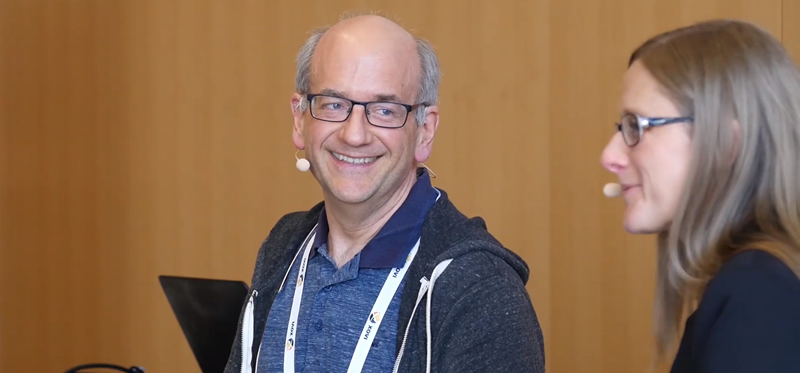
At the most recent International Search Summit in Munich, we were fortunate enough to be joined by none other than Google’s very own John Müller, a Webmaster Trends Analyst at the search engine who is well-known and well-loved in the SEO community.
He hosted an hour-long Q&A session with attendees of the conference, where he answered questions on a range of international SEO topics, including hreflang, canonicals, URL redirects, voice search, structured data, image search, ranking factors, duplicate content and progressive web apps.
If you want to watch a recording of the full Q&A session, you can view it on our training platform here.
Here is some of what he said:
Is click-through rate part of Google’s ranking algorithm? If not, is in indirectly involved?
From our [Google’s] point of view, we do use click-through rate to analyse the different algorithms to see how the algorithms are performing. We make a lot of algorithm changes, so it is something that does have indirect effects.
But using click-through rate as a direct ranking factor? I think that would be really problematic. For example, if YouTube were to use click-through rate as a ranking signal, all of the really controversial and click-baity videos would collect all these clicks and rank highly – but that doesn’t mean that they’re the best videos! It would just be a case of, “Oh, this thumbnail looks so weird; I’m going to click on it!” but that doesn’t mean it’s the best result. So, using click-through rate as a ranking signal, on a per page basis, I think, could cause a lot of harm and really ruin the relevance of the search results.
What makes Google choose a page as a canonical? Specifically, in a scenario where Google chooses a URL to be the canonical that is different from the one that is set on a website.
This is one of those things where people come up to me all the time and they’re like, “John, I have a rel canonical here, why do you not follow what I demand? You should do what I tell you!”, and then we look at it and we’re like, “Well, all of your internal links point here, and your rel canonical points somewhere else. What do you actually want? We’re confused!”
So, in such cases, we look at things like where the redirects go, internal links, external links, sitemaps and hreflang. We also prefer shorter URLs over longer URLs, especially if you have a lot of URL parameters.
We look at all of these factors and we add them up, we give them weights, and then, out of the “set” of URLs that we’ve identified as belonging to the same cluster, i.e. URLs with the same content, we pick the one that has the highest score.
So, if your rel canonical is saying one thing, but everything else is saying something else, then we’ll pick the other URL, instead of the one that you have specified in the rel canonical.
How long should you keep redirects after you’ve permanently moved your website?
I think the easy answer is that they’re called permanent redirects because they’re permanent! In practice, though, I guess it is something where you have to draw a line at some point, because eventually you’ll have so many redirects in place that it becomes hard to maintain and you cause yourself problems by keeping them there.
So, usually what I recommend is one year. We crawl most URLs at least twice a year, so if you keep the redirect for a year, then we’ve probably crawled it at least twice and we can process that.
An important thing to remember is that if we find new links to the old URLs, then we’ll try to look at the old URLs again. If they return 404, that’s fine. But if they return 200 and contain the same content as the other URL, then we’re stuck in a situation where we have two URLs with the same content.
John’s answers were edited for brevity and clarity.
International Search Summit Munich took place in April 2019. Want to attend a future summit? See all our upcoming events here!
Gemma Houghton
Latest posts by Gemma Houghton (see all)
- Watch the recording: How to identify and seize growth opportunities in international markets - April 20, 2022
- International marketing recruitment: How to drive global growth amid The Great Resignation - February 23, 2022
- 5 trends to include in your 2022 international digital marketing strategy - December 21, 2021




